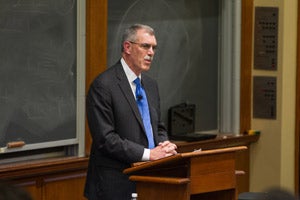According to U.S. Solicitor General Donald B. Verrilli, Jr., the defining feature of his job—the most challenging, rewarding aspect—is grappling with what the position of the United States should be on an issue. Verrilli explained that this task is harder than it might seem, involving a balancing of interests and making considered decisions on whether the U.S. should modify a previously held position.
Verrilli’s talk, held Wednesday, Oct. 31 at Harvard Law School, was sponsored by Law and Government Program of Study Faculty Leaders David Barron and Richard Lazarus.
“I don’t know whether in my time in office, I have gotten that right, or I will get it right,” Verrilli said. “They’re exceedingly difficult and challenging judgments, but every solicitor general has described this as the greatest legal job one could have, and it certainly has been for me. And one of the main reasons why is dealing with this set of issues…often of great moment.”
Francis Biddle, who was solicitor general from 1939 to 1940, once claimed that the solicitor general serves an abstract client, and has “no master to serve but his country.” But Verrilli said he has a somewhat different view. “Having been awakened more than once in the middle of the night by phone calls from angry general counsels from Cabinet departments about decisions I had made, [I think] the client is anything but an abstraction.”
Rather, he said, he must manage disagreement within the executive branch, in which different offices may have sharply divergent interests in what position the solicitor general should take.
Formally, the solicitor general exists to assist the attorney general, and has been delegated certain authority, including litigating in the Supreme Court, deciding when to appeal cases and determining whether to file amicus briefs. But the practical question of how to exercise that formal authority—and in particular when to modify positions—is more complicated, Verrilli said, and there are three schools of thought that try to answer it.

Law and Government Program of Study Faculty Leader David J. Barron ’94, Harvard Law School’s Hon. S. William Green Professor of Public Law, co-sponsored the event. Barron served in the U.S. Department of Justice as acting assistant attorney general for the Office of Legal Counsel from 2009 to 2010.
First, the “tenth justice model” views the solicitor general as an additional member of the Supreme Court, making his own legal decisions. In another, the “institutional model,” the solicitor general functions as an advocate for the long-term institutional interests of the executive branch. And in the third model, the solicitor general—as an officer of the executive branch—advocates primarily for the president’s view.
In Verrilli’s view, the correct model is none of the above. On the one hand, he said, positions taken by the solicitor general function not unlike precedent, he said: They are not immutable but require strong arguments to change them. In general, there is a need for stability, in part because of the special relationship the solicitor general has with the Supreme Court. (Unlike private practitioners, he said, the solicitor general is frank with the court about jurisdictional defects, precedent and other potential issues, in order to maintain credibility.)
In deciding whether to change a position, Verrilli said, he must take into account the institutional interests of the United States, which often remain consistent, as well as legal policy judgments made by agencies and departments.
“There really isn’t any algorithm for figuring that out,” Verrilli said. “It’s really a matter of practical judgment and situation sense.”
This combination was put in use in October, he said, when he had to make an argument in Kiobel v. Royal Dutch Petroleum, a case under the Alien Tort Statute, which grants federal jurisdiction for torts committed by an alien in violation of international law. The United States decided to change its position in that case, he said: Where it previously opposed all extraterritorial applications of the statute, it now argued that extraterritorial application should be allowed for claims against direct perpetrators of human rights violations. During oral argument, Verrilli said, Justice Antonin Scalia asked him why the court should believe his arguments and not the solicitors general who came before and took the opposite position.
Because they’re persuasive, Verrilli said, to unexpected laughter in the courtroom.
Prior to becoming solicitor general, Verrilli worked in both private and government practice. He was a litigator at Jenner & Block, then served as associate deputy attorney general in the Department of Justice, and finally deputy counsel to the president before taking on his current role.
